
RPGs are hard to choose for this type of list. For one, very few RPGs worth their salt depend on their graphics. Other RPGs just frankly wouldn't be the same if they had updated looks. For instance, despite its quirks, the blocky looks of Final Fantasy VII are part of the game's odd and gripping charm. In fact, much of the series would look out of place if its graphics were overhauled too much.
With that in mind, there are a few games that either used their graphics to their advantage, or wouldn't be hurt with a little bit of an update.
The thing is, D&D is not to everyone's taste. The rules system is sometimes overly complex, even overwhelming. So it says something when a game can create a good enough story and environment that the nuances of the system don't feel out of place. BG2 was so well polished that even lots of people who don't like D&D have really enjoyed it.
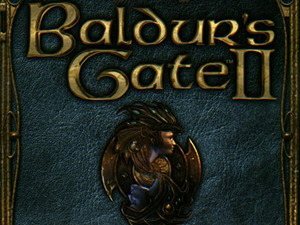
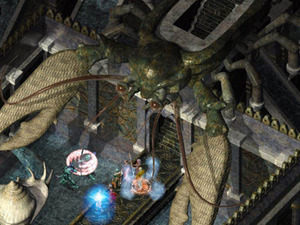 The story behind the game is too deep to get into much. Your character starts out with amnesia in a cell, and ends up in a world full of magic, mayhem, friends and enemies. The party system allows a well-balanced team that has its own dynamics, adding deeply to the replay. Though the graphics are still respectable, it would be great to see what could be done with the better graphics technology and developer tools available today.
The story behind the game is too deep to get into much. Your character starts out with amnesia in a cell, and ends up in a world full of magic, mayhem, friends and enemies. The party system allows a well-balanced team that has its own dynamics, adding deeply to the replay. Though the graphics are still respectable, it would be great to see what could be done with the better graphics technology and developer tools available today.
Set in "near" future after a nuclear holocaust, the game had a storyline that truly bent the normal concept of an RPG. The premise of the story involves your character being in charge of the water recycling of a fallout shelter (called a "vault"), and needing to repair the chip that controls the process. If you fail to do so within the allotted time, the people in your vault will die of thirst. So, armed with your trusty PDA and a few pitiful supplies, you set off to fix the chip.
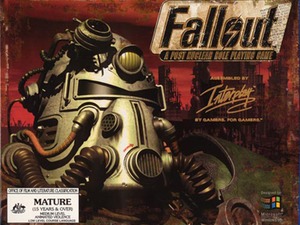
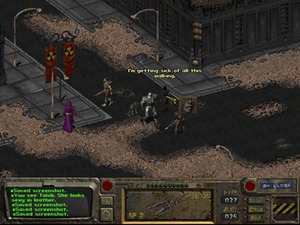 Along the way, you are introduced to an entire post-apocalyptic world of warring vaults, bandit raiders, mutated monsters and hazardous conditions. The well-written story makes you almost forget the urgency of your recycling debacle as the plot's concepts get bigger and bigger, eventually involving an entire mutant army.
Along the way, you are introduced to an entire post-apocalyptic world of warring vaults, bandit raiders, mutated monsters and hazardous conditions. The well-written story makes you almost forget the urgency of your recycling debacle as the plot's concepts get bigger and bigger, eventually involving an entire mutant army.
As original and involving as the game is, its isometric, tile-based graphics are a bit hard on the eyes. Furthermore, the game could greatly use the boost of some in-game cinematics, which would definitely help pull you into the rather unusual story a bit more. It would be great to see this get a new coat of paint rather than the promise of another sequel.
Ultima is truly a nod to the old days of game creation. It was both designed and published by Origin Systems, and every game from Ultima I (1980) through Ultima IX (1999) was presided over by Richard Garriott (aka "Lord British"). Ultima VII: The Black Gate really tipped the series in a whole new direction, where the entire world became interactive. It's possible to do everything from making weapons to milking cows in-game, and none of it feels out of place.
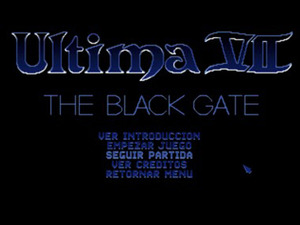
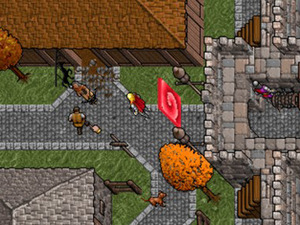 The game centres on your character, known as "the Avatar," who is to save the world of Britannia. Unlike most sword & sorcery RPGs, you don't actually hail from this land, however - Britannia exists in a totally different plane of existence, and as its champion, you are summoned by Lord British when needed. This time, you're summoned to solve a murder; but, of course, you unravel a much deeper, more sinister plot underneath.
The game centres on your character, known as "the Avatar," who is to save the world of Britannia. Unlike most sword & sorcery RPGs, you don't actually hail from this land, however - Britannia exists in a totally different plane of existence, and as its champion, you are summoned by Lord British when needed. This time, you're summoned to solve a murder; but, of course, you unravel a much deeper, more sinister plot underneath.
When the game was made in 1992, the graphics were leading edge. However, by now the game doesn't even run properly on most computers, and the only working port (Exult) is missing a few of the best features of the game.
With that in mind, there are a few games that either used their graphics to their advantage, or wouldn't be hurt with a little bit of an update.
Baldur's Gate II - Shadows of Amn
The quintessential RPG is a sword and some sorcery, and not many do it better than the Dungeons and Dragons series. Though over thirty games were released in the name of the ultimate geek franchise, not every one deserved a nod. In fact, out of all of them, only a few really spring to mind - but none are as well executed as Bioware and Black Isle's Baldur's Gate II.The thing is, D&D is not to everyone's taste. The rules system is sometimes overly complex, even overwhelming. So it says something when a game can create a good enough story and environment that the nuances of the system don't feel out of place. BG2 was so well polished that even lots of people who don't like D&D have really enjoyed it.


Fallout
The genre of RPGs was never so well expanded as it was with the release of Black Isle and Interplay's Fallout. This tile-based RPG won incredible critical acclaim at the time of its 1997 release, but has really shown its age since.Set in "near" future after a nuclear holocaust, the game had a storyline that truly bent the normal concept of an RPG. The premise of the story involves your character being in charge of the water recycling of a fallout shelter (called a "vault"), and needing to repair the chip that controls the process. If you fail to do so within the allotted time, the people in your vault will die of thirst. So, armed with your trusty PDA and a few pitiful supplies, you set off to fix the chip.


As original and involving as the game is, its isometric, tile-based graphics are a bit hard on the eyes. Furthermore, the game could greatly use the boost of some in-game cinematics, which would definitely help pull you into the rather unusual story a bit more. It would be great to see this get a new coat of paint rather than the promise of another sequel.
Ultima VII: The Black Gate
The Ultima series is one of the greatest RPG franchises that there was. Well, right up until Ultima 9 at least. Personally, I felt that the series reached its high point in between 7 (parts 1 and 2) and 8, which moved the games to a real-time, map-centric engine. This was a big turning point in the series, leading to three of the most fun RPGs I've ever played.Ultima is truly a nod to the old days of game creation. It was both designed and published by Origin Systems, and every game from Ultima I (1980) through Ultima IX (1999) was presided over by Richard Garriott (aka "Lord British"). Ultima VII: The Black Gate really tipped the series in a whole new direction, where the entire world became interactive. It's possible to do everything from making weapons to milking cows in-game, and none of it feels out of place.


When the game was made in 1992, the graphics were leading edge. However, by now the game doesn't even run properly on most computers, and the only working port (Exult) is missing a few of the best features of the game.

MSI MPG Velox 100R Chassis Review
October 14 2021 | 15:04









Want to comment? Please log in.